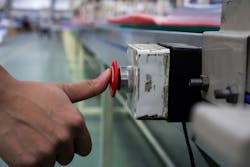Whether your customer is internal (e.g., you perform maintenance, and the production department is your customer) or external (e.g., you work for a service firm), you generally have to make the customer happy.
However, there are limits to “the customer is always right.” Obviously, if a customer tells you to do something illegal you have legal protection for refusing. Or if you’ve worked out from NFPA 70E requirements that you need an arc flash suit and the customer tells you not to bother, you are smart enough to wear it anyhow.
But what if the customer is engaging in unsafe acts? Does it matter whether the unsafe act could affect your safety or not? Legally, you could be found to have had an obligation to stop the customer even if the unsafe action probably won’t reduce your own safety.
For example, the customer isn’t an electrician and reaches into a live panel you just removed the cover from. You are an electrician, so would be expected to intervene.
If you walk into a plant full of rotating equipment and nobody is wearing safety glasses, what’s your obligation then? You’re not the safety director, but you know this is a hazard. The company’s management would also be expected to know (OSHA has a few things to say about that). Probably your response here isn’t to address the one unsafe act you see, but to anticipate safety problems you do not yet see because there’s a lack of safety awareness.
You have to consider each incidence separately. If the matter isn’t urgent, discuss the situation with your supervisor. If it’s agreed to bring up the issue with the customer, do so with diplomacy. Keep the focus on improvement, and don’t make accusatory or judgmental statements. Ask them if they see a safety issue, and what it might be. Then discuss with them how to improve the safety margin, aiming to make it so they walk away feeling like it was their idea. This way, rather than offend a customer you make a friend.
About the Author

Mark Lamendola
Mark is an expert in maintenance management, having racked up an impressive track record during his time working in the field. He also has extensive knowledge of, and practical expertise with, the National Electrical Code (NEC). Through his consulting business, he provides articles and training materials on electrical topics, specializing in making difficult subjects easy to understand and focusing on the practical aspects of electrical work.
Prior to starting his own business, Mark served as the Technical Editor on EC&M for six years, worked three years in nuclear maintenance, six years as a contract project engineer/project manager, three years as a systems engineer, and three years in plant maintenance management.
Mark earned an AAS degree from Rock Valley College, a BSEET from Columbia Pacific University, and an MBA from Lake Erie College. He’s also completed several related certifications over the years and even was formerly licensed as a Master Electrician. He is a Senior Member of the IEEE and past Chairman of the Kansas City Chapters of both the IEEE and the IEEE Computer Society. Mark also served as the program director for, a board member of, and webmaster of, the Midwest Chapter of the 7x24 Exchange. He has also held memberships with the following organizations: NETA, NFPA, International Association of Webmasters, and Institute of Certified Professional Managers.
